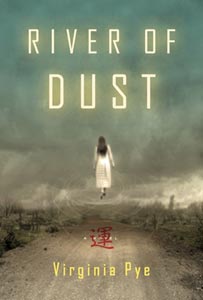 |
|
Virginia Pye's latest novel is set in Shanxi province in the early 20th century. |
"Mai Lin is quite an entertaining character, yet is also very clear-eyed," Pye says. "What we start to see, bit by bit, is that the American characters aren't really seeing the situation around them clearly. When they get more and more confused about things, she's the one who speaks the truth."
Among the book's selling points are its exotic locales: Chinese opium dens, dusty plains and Mongolian circuses, set against a background of drought and famine.
Pye says that vague memories from a year spent in Hong Kong as a toddler helped her, and "filtered down to these fictional characters".
She was further inspired by the trinkets that two generations of her ancestors brought back from China. Her father, Lucian W. Pye, grew up under Japanese colonial rule and returned to work for the US marines in Beijing. A prominent Sinologist, he wrote more than 20 books on China and Asia.
"The final impetus to write my novel was (my grandfather's) eloquence, and the language of that time, and I wanted to mimic that, in my own voice," she says.
While this may evoke other books, such as Charles Frazier's Cold Mountain, another piece of historical fiction inspired by the author's great-great uncle during the US Civil War, River of Dust is a different beast. It paints in broader strokes and contrasts the perspectives of characters from different worlds. Each chapter is told from the point of view of one of the main four characters.
Those looking for a female American writer's take on the kind of subject matter dealt with in Jiang Rong's Wolf Totem would also be mistaken. River of Dust belongs as much to what Pye calls "the China of my mind" as to the real world of the past.
Yet its thematic content resonates at a time when - at least from China's perspective - the West is still trying to impose its views on the country.
"My grandparents held the colonial perspective that they were going to come here and change the world, and improve things," she says.
"I am not an expert on China. My father was, and I think I've inherited a little bit of his perspective, which is that China will, in the end, not be imposed upon. In a way, that's what my novel ends up showing.
"I read a lot of colonial literature to try and understand (this)," she adds. "So I tried to write my own Heart of Darkness, you could say, in a different setting."
Impressed by the prescience of her grandfather's observations - he predicted an imminent shift in the balance of power from West to East - Pye read excerpts from his journals during her talk.
The following quote reveals his opinion of the Chinese: "Their physique is excellent. They can live anywhere, and certain sections of them are disposed to immigrate; they are civilized, laborious and excellent men of business; why have so large and gifted a people not conquered the world?"
River of Dust is Pye's sixth written novel and her first published book. She wrote it - a distilled and re-imagined version of a much longer project - in 28 days.
It hit US shelves in May 2013 and is available to English-speaking readers in China on Amazon. It is also on Kindle and Nook.
Pye has met with publishers in Shanghai to discuss a Chinese translation. She is now working on another novel set in China in 1937 with a female American protagonist.
